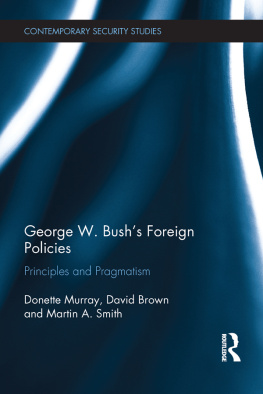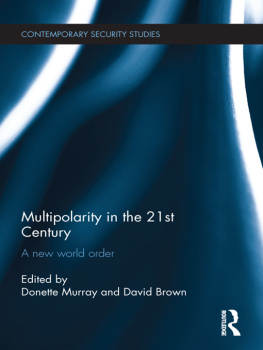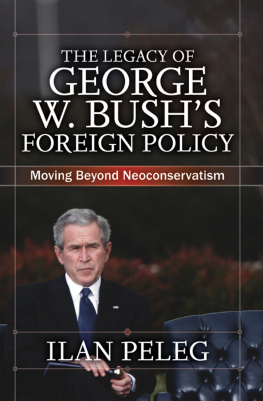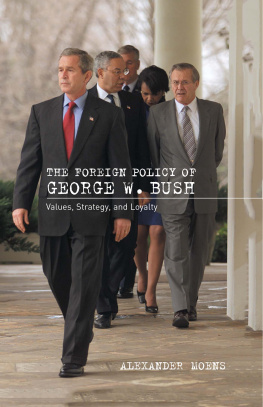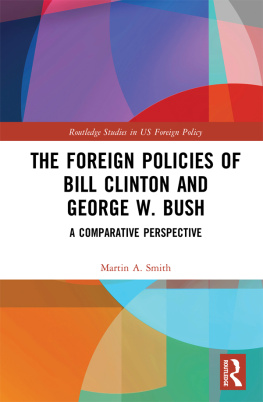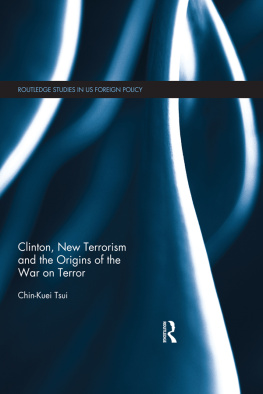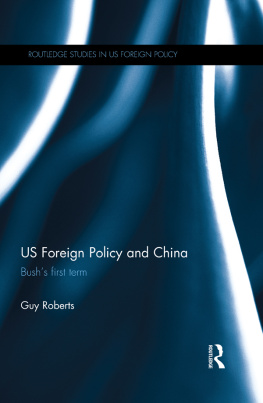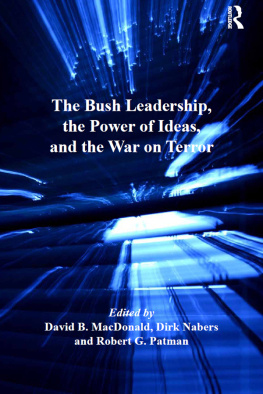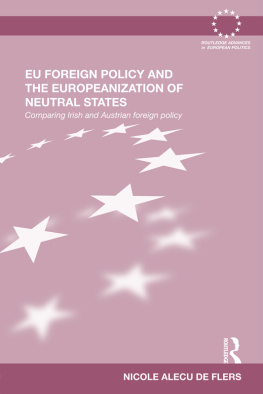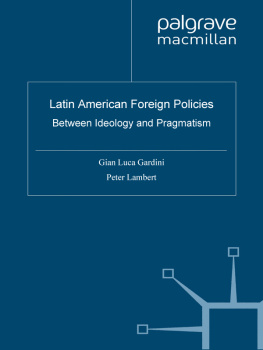George W. Bushs Foreign Policies
This book offers a fresh assessment of George W. Bushs foreign policies.
It is not designed to offer an evaluation of the totality of George W. Bushs foreign policy. Instead, the analysis will focus on the key aspects of his foreign and security policy record, in each case considering the interplay between principle and pragmatism. The underpinning contention here is that policy formulation and implementation across Bushs two terms can more usefully be analysed in terms of shades of grey, rather than the black and white hues in which it has often been painted. Thus, in some key policy areas it will be seen that the overall record was more pragmatic and successful than his many critics have been prepared to give him credit for. The president and his advisers were sometimes prepared to alter and amend their policy direction, on occasion significantly. Context and personalities, interpersonal and interagency, both played a role here. Where these came together most visibly for instance in connection with dual impasses over Iraq and Iran exigencies on the ground sometimes found expression in personnel changes. In turn, the changing fortunes of Bushs first term principals presaged policy changes in his second. What emerges from a more detached study of key aspects of the Bush administration during a complicated and challenging period in the United States post-Cold War history, marked by the dramatic emergence of international Islamist terrorism as the dominant international security threat is a more complex picture than any generalization can ever hope to sustain, regardless of how often it is repeated.
This book will be of much interest to students of US foreign policy, international politics and security studies.
Donette Murray is Senior Lecturer at the Royal Military Academy Sandhurst.
David Brown is Senior Lecturer at the Royal Military Academy Sandhurst.
Martin A. Smith is Senior Lecturer at the Royal Military Academy Sandhurst.
Contemporary Security Studies
Series Editors: James Gow and Rachel Kerr
Kings College London
This series focuses on new research across the spectrum of international peace and security, in an era where each year throws up multiple examples of conflicts that present new security challenges in the world around them.
Prosecuting War Crimes
Lessons and legacies of the International Criminal Tribunal for the former Yugoslavia
Edited by James Gow, Rachel Kerr and Zoran Paji
The NATO Intervention in Libya
Lessons learned from the campaign
Edited by Kjell Engelbrekt, Marcus Mohlin and Charlotte Wagnsson
Truth Recovery and Transitional Justice
Deferring human rights issues
Iosif Kovras
Reconstructing Afghanistan
Civilmilitary experiences in comparative perspective
Edited by William Maley and Susanne Schmeidl
Strategic Narratives, Public Opinion and War
Winning domestic support for the Afghan War
Edited by Beatrice De Graaf, George Dimitriu and Jens Ringsmose
Liberal Wars
Anglo-American strategy, ideology, and practice
Edited by Alan Cromartie
Prosecuting Slobodan Miloevi
The unfinished trial
Nevenka Tromp
Media Strategy and Military Operations in the 21st Century
Mediatizing the Israel Defence Force
Michal Shavit
Ethics, Law and Justifying Targeted Killings
The Obama administration at war
Jack McDonald
Quasi-State Entities and International Criminal Justice
Legitimising narratives and counter-narratives
Ernst Dijxhoorn
George W. Bushs Foreign Policies
Principles and Pragmatism
Donette Murray, David Brown and Martin A. Smith
First published 2018
by Routledge
2 Park Square, Milton Park, Abingdon, Oxon OX14 4RN
and by Routledge
711 Third Avenue, New York, NY 10017
Routledge is an imprint of the Taylor & Francis Group, an informa business
2018 Donette Murray, David Brown and Martin A. Smith
The right of Donette Murray, David Brown and Martin A. Smith to be identified as authors of this work has been asserted by them in accordance with sections 77 and 78 of the Copyright, Designs and Patents Act 1988.
All rights reserved. No part of this book may be reprinted or reproduced or utilized in any form or by any electronic, mechanical, or other means, now known or hereafter invented, including photocopying and recording, or in any information storage or retrieval system, without permission in writing from the publishers.
Trademark notice: Product or corporate names may be trademarks or registered trademarks, and are used only for identification and explanation without intent to infringe.
British Library Cataloguing in Publication Data
A catalogue record for this book is available from the British Library
Library of Congress Cataloging in Publication Data
Names: Murray, Donette, 1973 author. | Brown, David, 1974 author. | Smith, Martin A., 1965 author.
Title: George W. Bushs foreign policies : principles and pragmatism / Donette Murray, David Brown and Martin A. Smith.
Description: Abingdon, Oxon ; New York, NY : Routledge, 2017. | Series: Contemporary security studies | Includes bibliographical references and index.
Identifiers: LCCN 2017015311| ISBN 9780415486613 (hardback) | ISBN 9781315778969 (ebook)
Subjects: LCSH: United StatesForeign relations20012009. | Bush, George W. (George Walker), 1946 Influence.
Classification: LCC E902 .M86 2017 | DDC 327.73009/05dc23
LC record available at https://lccn.loc.gov/2017015311
ISBN: 978-0-415-48661-3 (hbk)
ISBN: 978-1-315-77896-9 (ebk)
Typeset in Times New Roman
by Wearset Ltd, Boldon, Tyne and Wear
As is customary with authors, we have incurred several debts during the preparation of this manuscript. The RMAS Library has been, as always, an invaluable source of books and articles to aid our research. In addition, Andrew Orgill and his team have been unfailingly helpful often above and beyond the call of duty in assisting us to track down material that was not readily available.
Our colleague Dr Aaron Edwards kindly read the whole manuscript prior to submission. He offered valuable observations about the overall cohesiveness of our efforts, as well as helpful comments on the arguments advanced in individual chapters.
Hannah Ferguson, our editor at Routledge, has been helpful and encouraging throughout the writing process. In particular, she provided just the right amount of gentle pressure towards the end to encourage us over the finishing line.
Finally, we are pleased to acknowledge the influence of successive generations of Officer Cadets and British Army Captains whom we have taught in our classes at Sandhurst and elsewhere. Given the many demands on their time and energies imposed by military training and life, we are gratified by their interest in academic study, and willingness to engage each other and us in the cut- and-thrust of intellectual debate. Overwhelmingly, they are a pleasure to teach.

